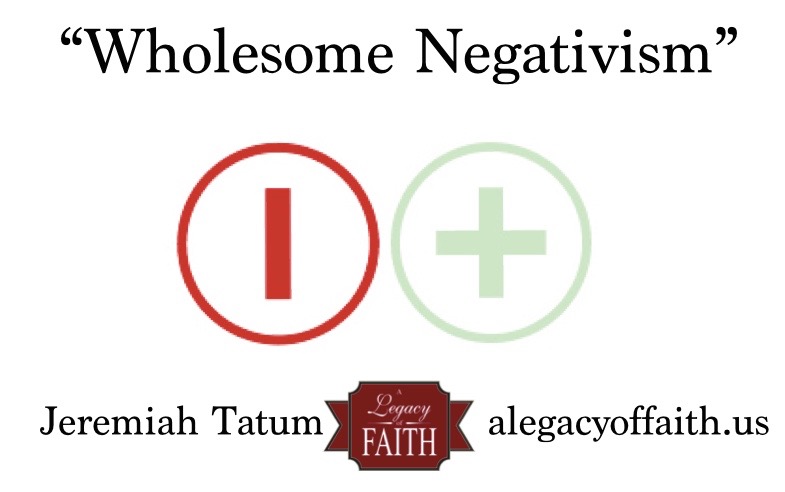“Wholesome Negativism”
This past week while attending a ministers’ workshop I heard a preacher deliver a message on the Lordship of Christ. This brother, who is older and wiser and who has served in the kingdom for over 50 years, introduced to me a term that I had never heard before. After he first reminded us that saying, “Yes” to Jesus also means saying, “No” to self, he included that Christians need a good helping of “wholesome negativism.” Like I said, I have never heard it put exactly that way before. But after a few moments I began to understand what he meant.
We often shy away from anything that we deem as negative. We don’t like to hear negative comments or criticism. We don’t gravitate toward negative personalities. We don’t enjoy negative preaching or instruction. Let’s face it, human beings don’t like being told what to do, and this is especially true if the word “no” is involved. But we need boundaries. We need discipline. We need a love that sometimes says no.
Eight of the Ten Commandments are negative. 365 of the 613 laws of Moses’ day were negative. Right and wrong, yes and no, are just a part of life. We have to say no every day to: lying, cheating, stealing, pornography, filthy entertainment, immodesty, drunkenness, fornication, and everything else that is immoral or questionable. A distinguishing mark in God’s people, the church, is our willingness to say no when the rest of the world says yes.
Notice that negativism is not alone here, but it is qualified and aided by the word “wholesome.” Webster defines this as, “conducive to moral or general well-being; salutary; beneficial; helping to improve or keep the body in good condition; healthy for the mind or morals.” Negativity can be good for us if the reason behind it is pure. What a novel idea! Especially since we have gotten used to the objection in our culture that exclaims, “I have my rights!” I am frankly tired of the tenor of such statements. There is nothing attractive about selfishness. But the genuine discipleship of Jesus is attractive because it is the recognition that we willingly gave up our rights when we made Jesus both Lord and Christ (Luke 6:46).
No to self, however, does not mean less of self. There are no qualifiers in surrender. No to self can only ever mean giving up full control to someone else. That someone else is the One who first gave Himself completely on the cross. He is worthy of our sacrifice. We are not just submitting to anyone. We are surrendering all to our wonderful Savior. We are laying ourselves down at the precious wounded feet of the Son of God.
If the cross of Christ ever taught us anything, it taught us that what God’s grace wants is better and lovelier than what we want. And that is what makes Christianity the most beautiful thing we will ever do.
“Father in heaven, hallowed be Your name. I ask today that you will help me to say no. Help me say no when I am tempted. Help me to say no to those things that draw me away from You and attach me to the world. Help me to say no to those who may cause me to stumble or fail in time and energy. Help me to say no to those who are under my direction who require Your guidance. Help me above all to say no to what I want and yes to want you want. In Jesus’ name, Amen.”
“If anyone teaches otherwise and does not consent to wholesome words, even the words of our Lord Jesus Christ, and to the doctrine which accords with godliness, he is proud, knowing nothing…” – (1 Tim. 6:3-4a)
——————-
To Receive Every Post via Email for Free, Click Here
Photo background credit: Xanthi on Creative Commons




